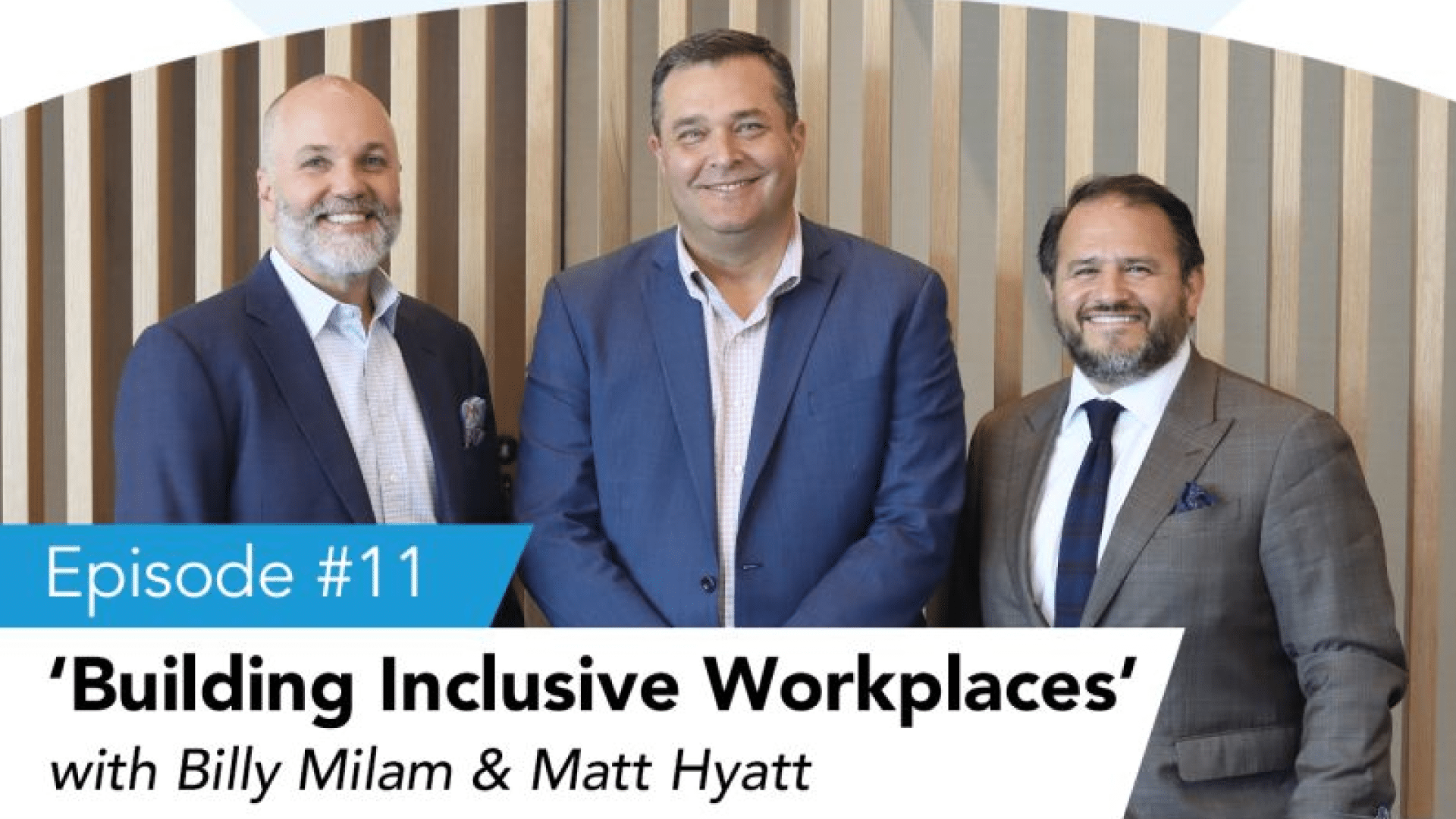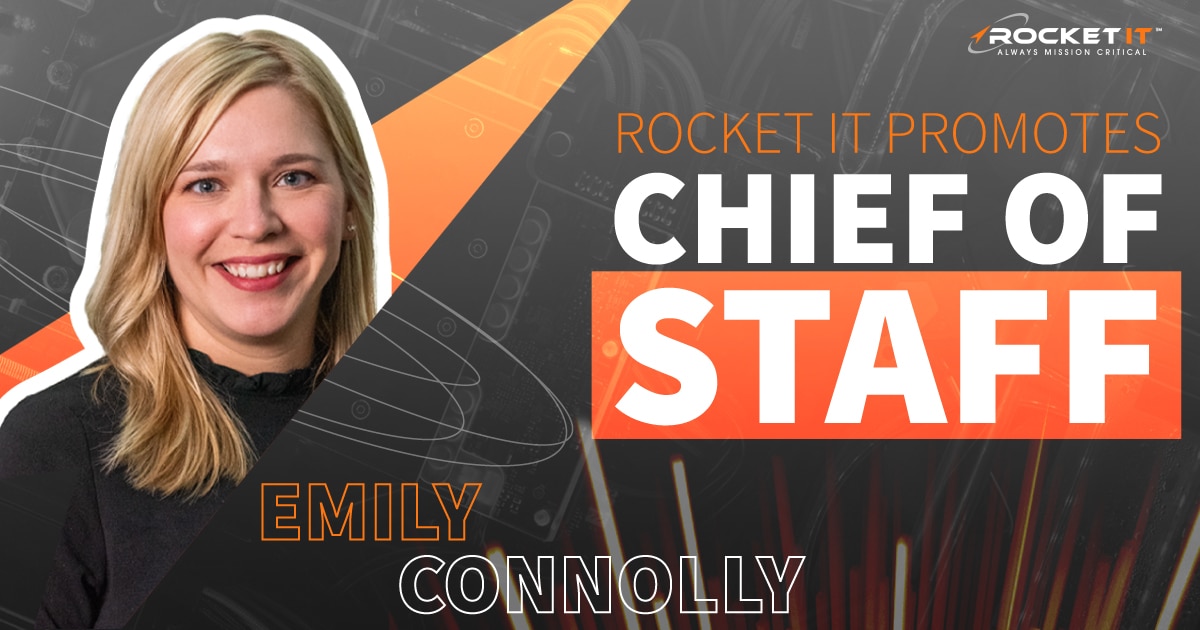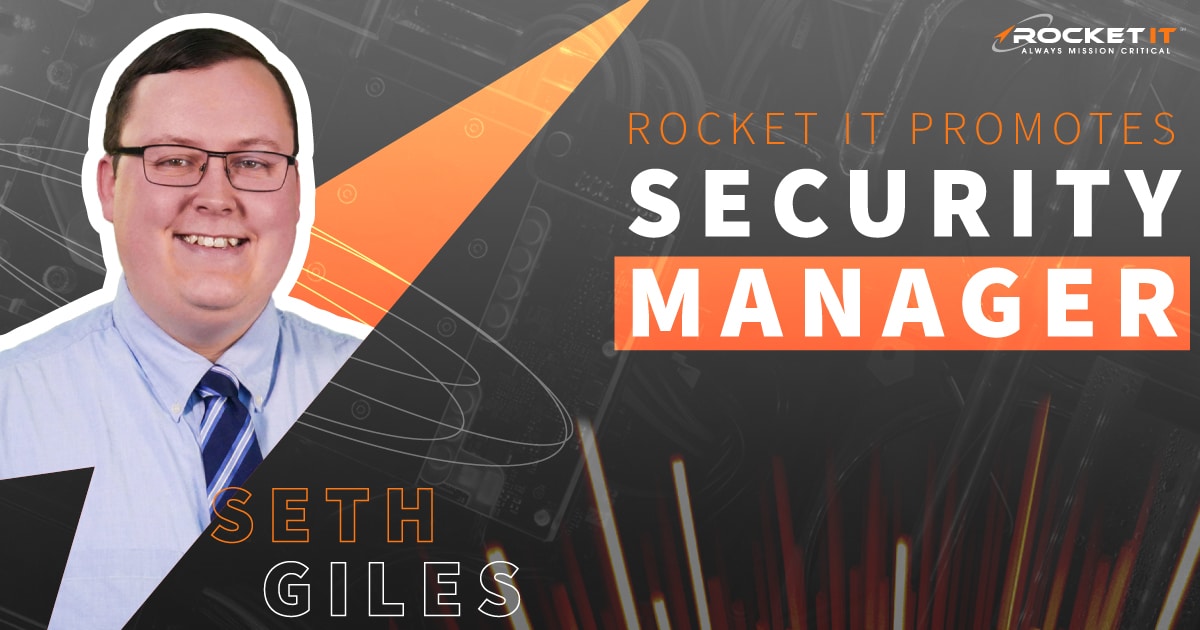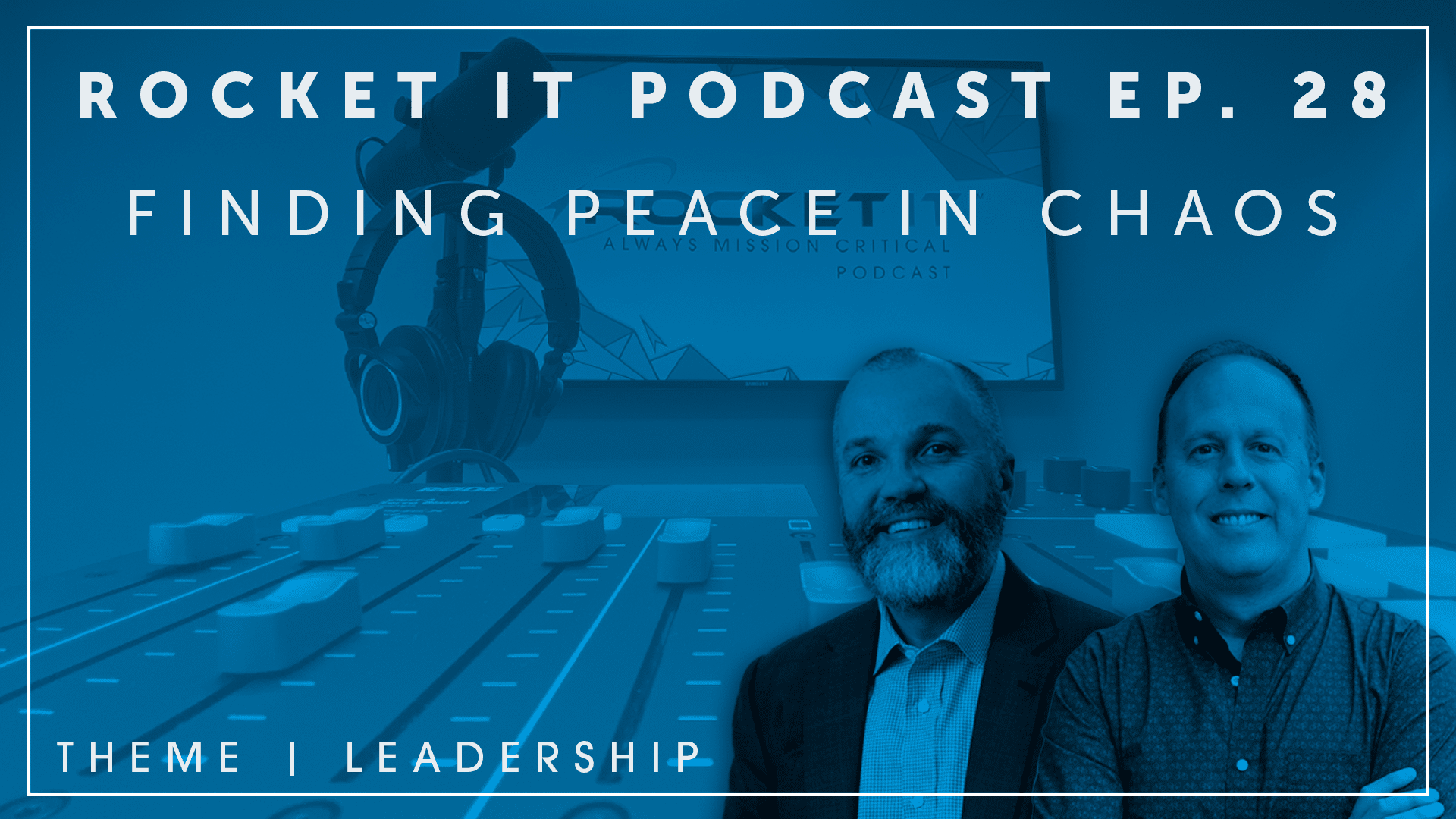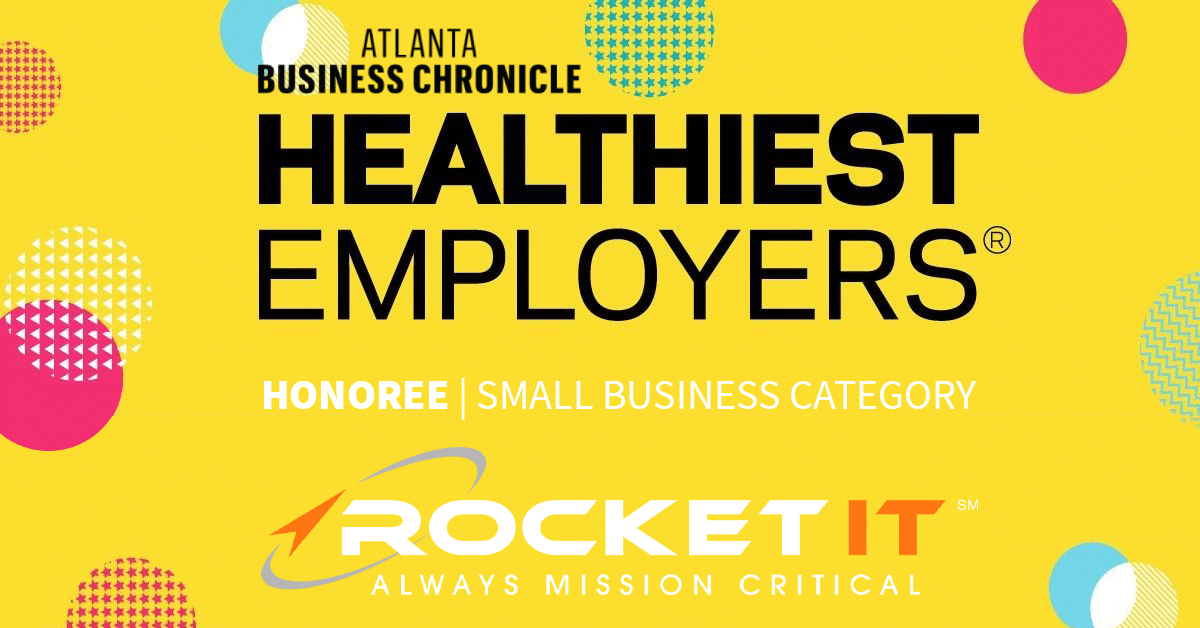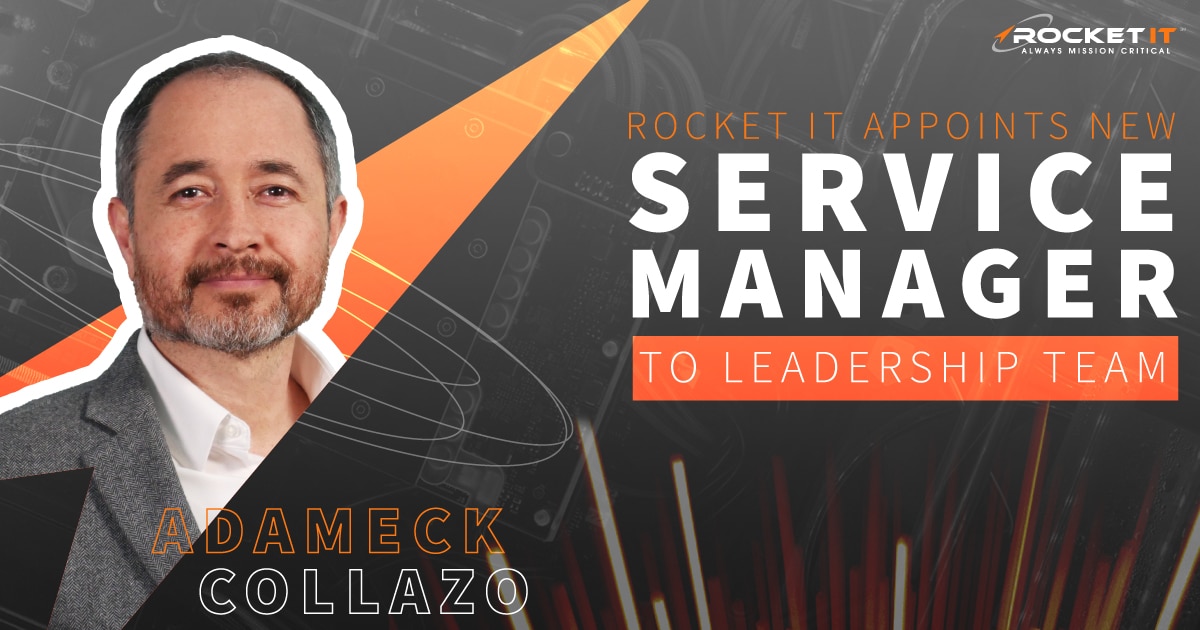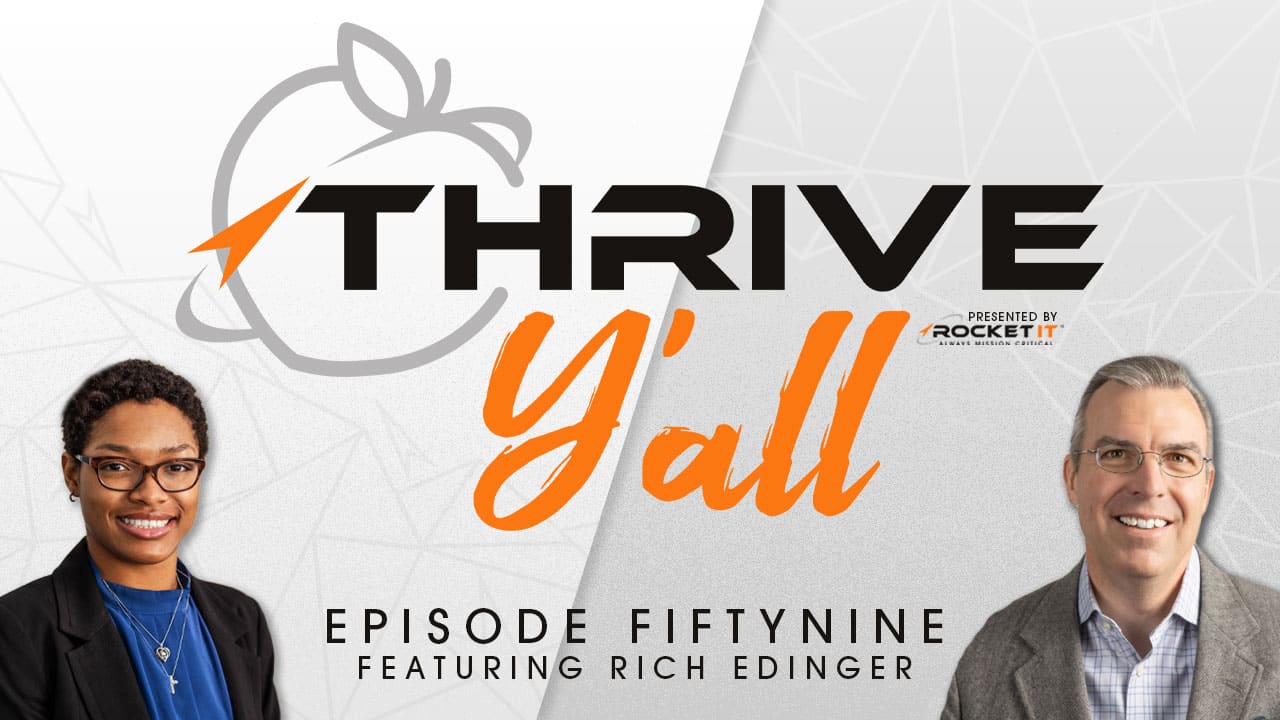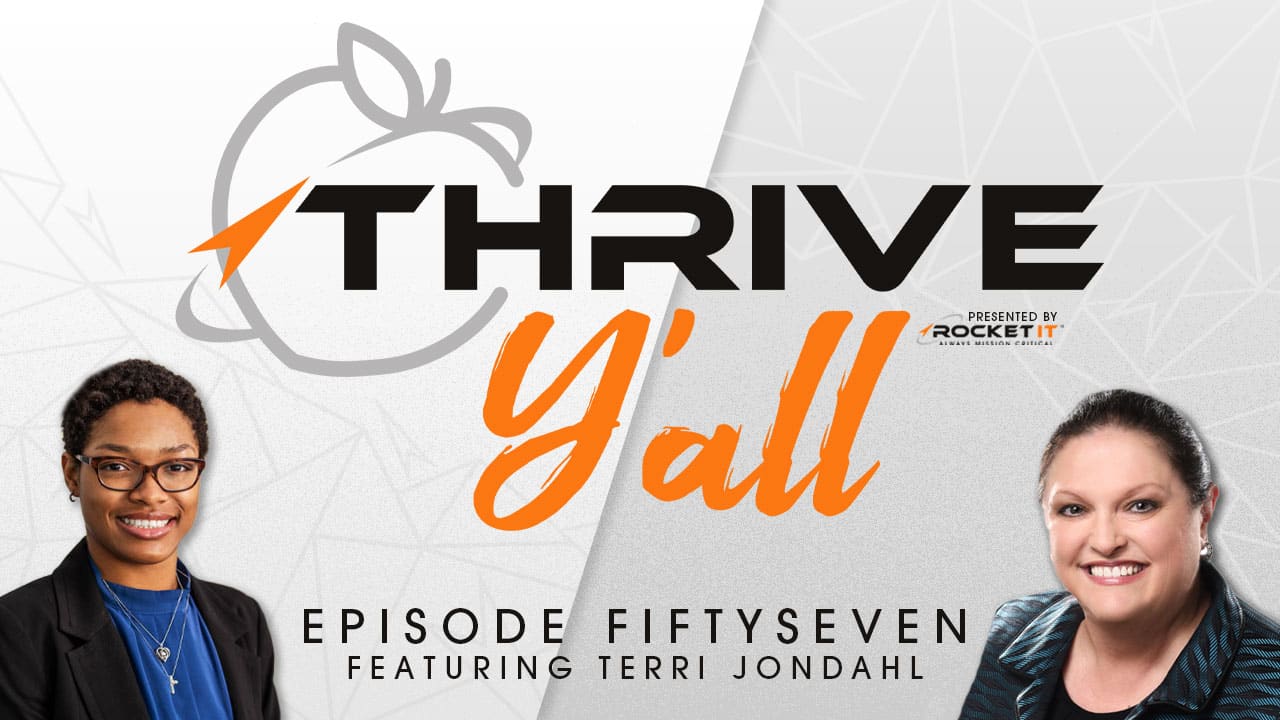Rocket IT Business Podcast | Jeremie Kubicek | Who Says You Can’t | Ep 13
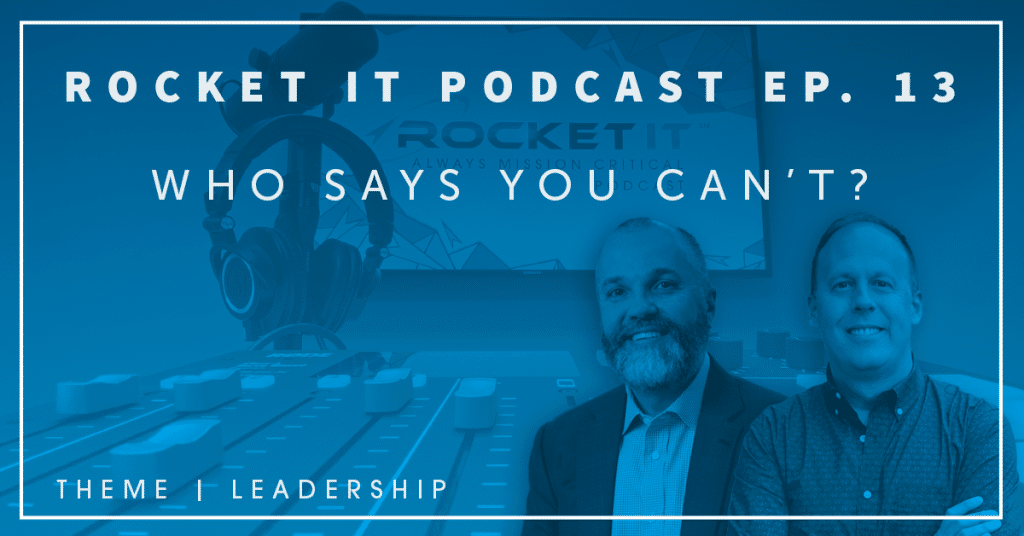
In this episode of the Rocket IT Business Podcast we have the pleasure of speaking with one man that has made it his life’s mission to encourage, equip and empower leaders across the globe. Having now founded over 20 businesses ranging from e-commerce to entertainment, Jeremie Kubicek is the embodiment of an entrepreneur.
In addition to his current efforts at GiANT Worldwide and his real estate development business, Jeremie is an acclaimed author; with his most recent book making Amazon’s top-ten list of best business books in 2019. But regardless of the endeavors Jeremie pursues, his passion to fight for the highest possible good in those he leads is something to behold.
In This Episode, You’ll Hear More About…
- The process of idea filtering
- Planning for major transitions
- How to innovate upon proven success
- Why to follow through with aspirations
- Understanding where you fit in the team
- Keeping an aligned vision with leadership
- The importance of learning from mistakes
- Creating a business with a lasting impression
- Learning to work with valued business partners
- Making a global impact through innovative business
- Removing the word “can’t” from your vocabulary
- Staying connected with others while growing a business
- Connecting with those who have contrasting personalities
- Understanding that it’s not what you do, it’s who you work for
Jeremie Kubicek Contact Information
jeremiekubicek.com | giantspeakers.com
Resources Mentioned
Like What You Heard? Give Us Some Feedback!
- Host: Matt Hyatt
- Guest: Jeremie Kubicek
Show Transcript
Matt (00:00):
Hello and welcome to the Rocket IT podcast. I’m your host Matt Hyatt. And today we have the pleasure of speaking with one man that has made it his life’s mission to encourage, equip, and empower leaders across the globe.
Intro (00:27):
[Music Plays]
Matt (00:28):
Having now founded over 20 businesses ranging from e-commerce entertainment. Jeremie Kubicek is the embodiment of an entrepreneur. In addition to his current efforts at GiANT Worldwide and his real estate development business, Jeremie is an acclaimed author with his most recent book making Amazon’s top 10 list of best business books in 2019. But regardless of the endeavors, Jeremie pursues his passion to fight for the highest possible, good for those he leads is something to behold, and we’re happy to have him on today’s segment. So without further ado, Jeremie, welcome to the show.
Jeremie (00:59):
I made it. I made it to the Rocket IT podcasts, man. Yes.
Matt (01:07):
It’ll be interesting to look back, Jeremie and see whether this episode resulted in a dramatic increase or decrease in a list. I know it’s going to be great
Jeremie (01:17):
Hair loss. Is that what you meant? Like that’s both of us. Yeah.
Matt (01:23):
Oh, that’s right. We both have that, that issue. So Jeremie, I’m so glad you’re here. I was going to be fun to have a have a conversation with you that you and I have known each other for quite a while now and spent a lot of time together, but I’m excited to have you on the podcast and to introduce you to the folks that we know that are listening to to your show. So let’s start, let’s start from the beginning a little bit. I want to kind of go a little bit back in the Wayback machine. When you and I met, you were running an organization called GiANT impact, right? And what were you trying to do with GiANT impact? Tell us a little bit about that organization and what was the goal?
Jeremie (01:58):
To go way back, I had started a company called GiANT 2002 and we had a number of different entities and so we bought John Maxwell’s assets because we had focused on strategy, capital and people to help grow businesses. And the people part was what we decided to acquire with John Maxwell’s assets. And that that brought me to Atlanta, that brought me into Gwinnett County cause that was where their headquarters was and we assume that and put it into merged it into GiANT at that point in time. So that was trying to impact them. That was for those who don’t know, that was the catalyst conferences. We built that into a national brand. I created a brand called leader tasks and started that out of Gwinnett County and then we sold, you know, John Maxwell’s assets back to him. And so it was a, it was a fun season. And so that’s how we met. And you all obviously took care of us like champs helping us as already kind of a outsource and the it it
Matt (03:00):
Services space. Absolutely. We have the pleasure of working with you and your team and that was really cool. So I know that you had transitioned with that organization and moved away from that. In fact, you moved, one of the things I remember, you and I sitting together in a restaurant not far from a Rocket IT headquarters kind of talking about your future plans. And you know, at the time that I had spent with you, I knew you have as a a big thinker, lots of ideas, lots of aspirations, and very much thinking, a way to impact the globe. Like, you know, I’m, I’m really into impacting my community and you’ve kind of expanded that geographically quite a bit. You know, I want to go out and impact the world. And so we sat down together and he told me about your plans that you were kind of moving onto the next thing and the next big thing in your life. And that started with, Hey, you know what, I’ve decided that we’re going to sell the house and we’re gonna pack up the family and we’re going to move to Europe. And I remember you telling me, Hey, you know, I think we’ll probably start another business. But I’m also gonna use some time to travel around Europe a little bit, spend time with the family, get to know that part of the world. And every once in a while I’ll fly back to the U.S> to manage affairs here. How, how’s that working out for you?
Jeremie (04:17):
Yeah, it was great. A couple of things. It worked. So what you may or may not remember, but we had had nine GiANT entities. We were really influenced by Richard Branson and you know, GiANT lions, Virgin music, Virgin money, Virgin blah, blah, blah, blah. So we had the same ideas like, Hey, you know, we can scale by creating these enterprises. So we started nine GiANT entities. I think that eventually we may have had up to 12, but somewhere like that. And what happened was it was an experiment and I would say, eh, it kind of worked. It kind of didn’t. In fact I’d probably wouldn’t do it again. Because nine different directions with nine cooks in the kitchen going with a different vision. And I also really realized that we weren’t Richard Branson at the time. We were building that. So what I did is I had kept GiANT impact and I moved, let’s started GiANT Worldwide, another GiANT enterprise.
Jeremie (05:13):
Eventually I ended up taking them all back in, either selling them, turning them off, or merging them all into one. So we have GiANT, we have one GiANT, and it was just a great experiment, but the experiment with my family was dramatic as well. So we went over and we lived in a, you know, you’ve got to come there and experience it. But we went, we lived in this Manor house, 10 bedroom Manor house. And we basically have this philosophy who says, we can’t, we can’t, you know, work with, pick a company who says we can’t influence the British government who says we can’t work with Google or big companies, the us air force. And we kind of went with that attitude and kind of started a process. And so it spread. And we were building a business and I was trying to pour into my kids because I had just become Uber intentional with my family more than ever with my wife, with my kids. And so I started treating them differently, training them differently. I was involved in apprenticeship with them and multiplying and giving them and growing a business at the same time. It was just, it was awesome. The only reason we’d come back is because our kids wanted to,
Matt (06:28):
Yeah, there you go. So I want to make sure didn’t hear you say it. I want to make sure that it gets said so that Manor house was ordered in the rural part of the UK, not far from London, right? Yeah. Just outside of London. And I did get to go there, came, came and visited you and spent some time and I know a lot of our friends did as well. And that was really cool because you were kind of the same time you were working. I know you’re very intentional with your family at that time and in fact the entire time that I’ve known you, I think that that has been true but certainly saw that underscored while you were in the UK. But then at the same time you’re building this, this business and this is the path that you’ve been down before. This is not, you know, you’re not your first rodeo, right? You’ve thought you’ve started many businesses. So before we kind of move forward and, and hear about what’s happening with GiANT, give us some background cause I think, I think some of the things you’ve done or you know, unusual would be a good word to say. A rare, rare is maybe even a better word. You’ve done a lot. And so tell us about some of the businesses that you’ve been involved in over the years and something that I liked. All right, so inspiration.
Jeremie (07:37):
Grandmother took me to Europe when I was 15 years old.
Matt (07:41):
Okay.
Jeremie (07:41):
Inspired me. Like, Oh my goodness. She said it was this, I’ll never forget it was summer and I was a big skier and she said, you know, you can ski the Matterhorn in the summer. It’s a glacier. You got to go ski. I go, I don’t have anything.
Matt (07:57):
I don’t have my gloves on.
Jeremie (07:59):
She goes, you don’t need anything here. Take this. I borrowed people and I put socks for gloves and socks and I skied the Matterhorn and I’ll never forget, like my grandmother is like, well, who says you can’t? So you got everything you need. We’ll take these. I’m on your hands. So that’s what started that. And then I got to college and got influenced by professor who basically said, why don’t you use business to change the world? And I mean you can. How do you do it? And he showed me Asia and then we started a business in Russia together. My professor and I got a few other classmates and we started a, an accounting training, marketing consulting. And we eventually started a economic school in Russia, in Moscow. It’s called the Moscow economic schools. Still. It’s the largest private school in Moscow
Matt (08:51):
Now. All right, hang on a second. Just stop. Just a second there Jeremie. Cause I, you know, this is old hat to you,
Jeremie (08:56):
But for those that don’t remember our history, this was when 1983, just 1993 a year after the union fell apart. Wow. Isn’t that crazy? Yeah. So they welcomed you with open arms and said, welcome comrade from America. Go ahead and start a business here. Is that how it went? Well. So you find, so we have this philosophy, find people a piece who are the a piece. So we found this guy named Yuri Shambala. Yuri was our person a piece. He had the credibility, he had run the education in Moscow for the communist party and he basically had a major transformation. His life wanted to do something different. So we were the partners. So he ushered this in. We were, we looked like we were 16. We looked like obese. And so no one thought we were doing anything and we really weren’t.
Jeremie (09:59):
But we did. And we built up the business and eventually sold it and then kept on the school continues to thrive. And you know, it’s one of those like you grew up on John James Bond and John Wayne and then during the cold war, you know, you’re like, Hey, we’re Americans. What can happen to us, you know, is that kind of fear? All right, very naive. But unbelievably fun at the same time. Very cool. All right, what else? So we get back, I’m there and I’m getting engaged to my college best friend. Kelly. And so then we were going to live in Russia and the Oklahoma city bombing happened. So my father in law was in the bottom. He’s lost most of his staff. So that shifted us from there. We decided to move back to Oklahoma. My dad had this philosophy shared with me and it’s really important for those listening.
Jeremie (10:57):
He said in your 20’s, it’s not what you do, it’s who you work for, that’s most important. Find the person that you want to work for and basically align with them and that’s way more important than what you did. So I ended up working as a pure, I mean just completely white guys you can see in, you know, working in the African American haircare business. Primarily the natural next step when coming home from Russia. Primarily because of the Humphreys family. Kent Humphreys, he was like a Matt Hyatt. He was just an unbelievable leader. People wanted to be around him, had great, great intent, built a really nice business. And I became eventually his vice president of marketing and then they sold the business and I went to work for the, the private equity group that bought the business. And we bought 17 companies in three years. And I was in, wow. It’s beyond the acquisition team. And we were, I was on the East coast one week West coast the next week, traveling back and forth from Oklahoma for a number of years. Did that and that’s where I lost my hair for any seriously. I did various then we started some dotcoms and started the dotcom business. I started three.com sold one last one, turned one off and come bust and try all the different experiences.
Jeremie (12:25):
And then you have just started a number of businesses. You know, I think as I’m a connector in the five voices language, I’m a connector creative pioneer. So my connector is always seeing opportunities and connecting people. And so I’m partnering with people and I used to have a philosophy of a portfolio of where I might be involved in 10 different things at one time. Right. And I have calmed down quite a bit since then. So in 2002, we eventually started GiANT and that was the beginning of the story I told you before we started a growth consulting business then bought John Maxwell and then we spin growing in lots of different places ever since. But yeah, that’s a little history. Therefore you,
Matt (13:05):
Yeah, that’s, that’s awesome. I actually glad you mentioned the partnering aspect of the businesses that you’ve been involved in. My observation of you is that most of the business entities that I’ve known about and the ones that you and I have discussed, you, you have partner with other people. That seems to be not only a kind of an emo, but something that I think has worked very well for you. A rocket. It is a business that the not started on my own. I did have a partners in a very early season and that didn’t work out. And so it’s been basically me running the shop ever since. And there are times when that can be kind of a lonely experience, right. You know, there’s, if something’s going wrong, there’s nobody to really talk to about it. You know, you can’t talk to your team, let’s scare them to death.
Matt (13:54):
You can’t go home and talk to your wife about it, scare her to death. I certainly can’t talk to your kids. The dog doesn’t care. So, you know, at the end of the day it’s you, you look in the mirror and say, okay, you know, I’m just going to have to deal with this and, and so it can be, can be kinda tough. Is that the driving force behind the partnerships you’ve created or why, how did you end up in that position? Has it been intentional or is it just come naturally to you of, Hey, here’s an idea. Here’s, here’s the person I want to do this idea with? Well,
Jeremie (14:23):
It depends. I, I hear a lot of people and they’ll say things like, Oh, partnerships never work and I don’t believe that. Then I also say partnerships are not for everyone. For me there was a term in the financial world called the treat of one plus one equals three. It’s the same with marriage. A good marriage should equal three, not just two. It should be exponential. So marriage is a partnership. My wife is a business partner, she is a a partner and, and you know my love of my life. So you think about that calm that thinking a good marriage should work well. The same is true with business. For me, I think I’ve just created such big vision that I’m needed to have partners because I don’t think I could do it. I meant to do what we were wanting to do to raise up a different type of leader in the world, to actually create a scalable people development business globally.
Jeremie (15:22):
I needed help and it’s not just I can do alone. So you find skillsets. So Steve Cochran has been a cofounder and a business partner with me. He’s been so helpful in his being in yang, if you will. Just that difference that we bring, I probably bring a little bit more of the business background. He brings a lot more of the personality background. And so we merge along those things together and it seems to work out really well. But the term of creative means it needs to, if it’s bringing value, great. If it’s diluting, then you need to make some changes. And dilution, you know, you can feel dilution. So the, the commitment to each other is how do you add value? How do you, how do you add value to the organization to such a degree that it just makes sense.
Matt (16:14):
You know, there’s a, you touched on the, the spouse thing. You, there’s something you and Kelly have and my wife, Maureen and I think have, is you start realizing probably fairly on early on that Hey we’re different, you know, or different backgrounds different personality types, different preferences. We communicate differently. I might be more quick to point out something that, you know, I perceive as just an interesting fact versus a, my wife might not say something about a negative aspect of whatever, you know, the, the way the house looks or what’s going on with the money situation or how things are going with the kids or whatever. Because she’s concerned about how somebody else might feel if she were to say something. So in many ways, you know, I think the old adage of opposites attract is true. That many times will help folks get married.
Matt (17:05):
And maybe even in partnerships, they’re attracted, somebody brings something different to the table and that can easily spiral into a perception of conflict. Oh, I had, this is the way I am. And that’s the way that she is. And we’re different and we’re always butting heads. But the way I like to think about that is that a, that can be very complimentary, right? Maureen is strong where I’m weak and and in many cases I’m strong where she’s not feeling as confident. And so when you take those differences and put them together, you do get something more than just the sum of two parts, right? Is one of the things about that though is you know, for us, and I think for a lot of people out there, the marriage is really meant to be a lifelong commitment. And so even when we’re not feeling like we’re perfectly in sync, there’s no part of us that says, well, it’s not, it’s just not gonna work.
Matt (17:56):
It’s always, well it has to work. It is going to work. It is, you know, it is this, this is what we’ve chosen to do. And so we’re going to work our way through that. My point in all that is that may not necessarily be true in a business partnership. I don’t think anyone enters a business partnership saying, okay, this is for life. I don’t think. And so there’s always this mind towards what one of the options as well. We can just part ways and, and move on with our lives. So do you think about that kind of commitment? Is that enter into the equation when you’re thinking about a new business partnership, a season or this is for a mission or a project or, or whatever.
Jeremie (18:28):
I don’t, I’m not seeking a lot of partnerships. Meaning I have them have one now. So I’m not, you know, we’ve been in it for about six, almost seven years. So with my marriage, it’ll be 25 years this the summer. So it’s,
Matt (18:42):
Wow, Julie’s been putting up with you for a long time.
Jeremie (18:45):
I know you’re not. So what’s interesting though is you think about the concept that we use at GiANT fight for the highest possible good of those you lead. So those you love. So how do you find for the highest possibility of your spouse? So if you think about that verse just for a second, it’ll translate to partnership. Your obligation is to fight for their highest possible good. And if the other person is to fight for the highest possible good, that usually moves up. It takes you both to another level. If one person is fighting for and another person is fighting against, that’s where you have friction. That’s where you have an earthquake. If it’s a one person, it might be fighting for another person’s fighting for themselves. So there’s these dynamics at play. This same is true with partnerships. There’s seasons where a vision doesn’t get aligned.
Jeremie (19:42):
That was hard for me. You know, where there’s no vision, people perish was no vision. Partners will find their own vision. And so for me, I had vision for the GiANT brand, but I didn’t have geographical or consistency with my, some of my past business partners. And they had a different vision than mine, which was, it was fine. It was, became natural, but I was the founder of that. So I’m like, okay, well take your vision, take your clients and go for it because this is the bin that we have, you know? So, yeah. And they were all amiable and very, very well done because that’s the way we do it in GiANT. There’s not a lot of drama in that regard. So I think what it does to your point, it comes down to the vision. What is the, and has the vision changed?
Jeremie (20:35):
The vision can change meaning you know what man, I’m about to be an empty nester. Okay. Two months. Well this is a five months before college and all that, but let’s just say the next two, my daughter graduates. So if that’s the case, I’m an end of an era and then there’s a transition season and then it’s a new season. I think it’s okay for partners to think about eras. And go, hey, is there a natural end of an era? And then you almost have to you and go, Hey, where are we in it for the next round? You know, I know in my case was Steve talk him. We’ve changed our business model to a SaaS model. So Steve fast software as a service. That’s right. Yeah. Subscription model. So we’ve moved now and so our business is heavy tech, heavy content building technology platform business. So Steve, who’s been on our, our team, it moved out of the day to day operations of the organization, but he’s still on partner.
Jeremie (21:41):
He’s my part partner in content creation is my partner in that. He’s a non executive director still has ownership. He’s playing a different role and helping build our value in our business in a different way. But the needs that we had for our team, we’re very, very tech driven. So the conversations we’re having, I mean they’re above my head and a lot of places. So what’s happening is then Steve recognized it. It was really a great, so when you have a secure, confident, humble, mature partner and they realize, you know, I’m probably don’t need to be on the the team, like on the day to day business team, I probably need to be in this team out here in a different playing a different role. And he brought that to the table and it was very mature. It was great. The dynamics were amazing because we basically spent a few days planning it out, mapping out, and now we’ve been living that out.
Jeremie (22:42):
And you know, that’s just because of who he is. He’s very right. So if you don’t have that kind of personality on the other side, it can be very difficult if you have it. And there’s probably going to be a point in time where I go, you know what, there’s probably someone better to run this business than me if we get to levels that were we’re talking about. So yeah, sure. No, just saying natural era seasons. I wrote an article years ago and my team’s heard me talk about this a few times about, you know, the a hundred year business plan, what does it look like if an entrepreneur sits down or a leadership team sits down and writes a plan to see a business through to its 100th anniversary. And one thing we know if we sit down and we write that business plan, you’re going to look around the room pretty quick and realize that it’s unlikely that anybody writing that plan is be around to see it come to fruition. And so if we’re going to build a business that has the potential to see its 100th anniversary, one thing that we know for sure is that they’re by definition
Matt (23:46):
Almost must be a transition from the current owners or leadership team to a different owner and leadership team. And so what are the building blocks and the what’s the foundation that we need to put in place today to not only deal with that, that eventual inevitable transition, but to embrace it as, Hey, this is a natural part. A, I was reading an article at Berkshire Hathaway just last week, published its annual letter from the CEO and chairman. And so it was reading about that and what, what he said in that letter was that Berkshire Hathaway is 100% ready for his, a departure, you know, whether that’s retirement or, or something. Yes. So I love that idea of dealing in eras and thinking about how do we, you know, how do we treat ourselves as really as stewards of the organizations that we lead and planning for transitioning that to someone else’s sometime down the road.
Jeremie (24:44):
You know, this is, you know, we create content, we write content. Mainly the content that we create is based on real world situations. And I’ve been talking about this for about two months and the way it usually works is if I’m talking about something six months, I know it’s relevant topic and we start building things like performance or GiANT-izing performance reviews right now because that is such a major part of businesses. We’re working on some succession pieces, expectations, but one of them is on transitions. And I’ve, I really realized I’m really good at that. Like I’m not good at financials. Like don’t put me in as the CFO and then I need people to do that. I’m just not very good at that. But I’m really good at transition. And what I mean transition, I don’t mean just the simple act of, okay Matt, you’re now the new CEO.
Jeremie (25:34):
I mean the season of transition that people are. So for instance, I do this, my kids, I meet with them between 16 and 18 and I have an apprenticeship process when my kids EQ, IQ personality, what the 10 meals you need to learn before you leave this house. All of the things I can think of to help with the transition. I get ahead of it. I’ve done it with, this is my third child I’ve done this with and I do it based on their personality. It’s, it works brilliantly. It’s really great and it’s really fun. But when I sit down with them, I review once a quarter, I review that, see the transition season there. So I met with my daughter Kate. We couldn’t meet until this weekend. I met with her this weekend on let’s look ahead at your transitions. Graduating high school, two months of moneymaking, basically before college.
Jeremie (26:28):
What are you going to do? Nannying and babysitting and blah blah blah. And then you’ve got in transition into college. So let’s work on those ahead of time. So I’m very proactive. Some people I might be too proactive for them. They’re not thinking that way. But I, I go, I’m also been working for a couple of years with my wife’s transition into empty nest. Cause I know empty nest emails are typically more difficult, especially if they’ve been with the kids, you know, men to anyone who’s staying home with them more or with them is more of the caregiver. Well, so should we’ve been working on that transition by doing a real estate projects and that would be, that was the strategy for Kelly. A big part of it was that. So my point is if you look ahead, most CEOs, I know it works so hard on making the donuts every day, but they’re not thinking they know what to do to make the donuts.
Jeremie (27:24):
But they haven’t thought about, Hey, is this machine about to go out? We need to re say there’s a hole in their plan. Ooh, that was really good. Really quick is that to go, Hey, what does thinking ahead look like? What season are we currently what season are we moving to? Or what season is my wife or child or teammate? What transition season are they moving into? And then how do I help them acclimate, grow into how do I help them transition? And I think there’s a lot there. So anyway, yeah, yeah, absolutely. That’s really cool. So tell me, Jeremie, tell me a little bit about GiANT today. What, what is your mission? What are you trying to accomplish? How’s that going? You said you were six or seven years into it. And one thing that strikes me is, you know, I, I was very fortunate and that I got to be very close to you when in those early days.
Jeremie (28:24):
And so I got to see what are the initial idea and how it started. And I see what’s happening today and it’s a little different. I think the goal is the same, but your tactic or your approach I think has changed quite a bit. So I’d like to hear about that a little bit. By the way. That’s, that’s not a dig at all. My business is very different today than it was 10 years ago also. But I just thought to hear about kind of what are you, what are you trying to accomplish and what’s, what’s new in the way that you’re approaching it? I’m going to reverse it and ask you to tell an explain. Matt, what is GiANT? Give me the one sentence. Yeah. So I’ll tell Mike, I think you’ll probably correct me because here’s the deal. You know, when I’m telling people about GiANT, I’m usually telling them, Hey, this is a leadership development company with people that work in an apprenticeship model with other leaders and rising leaders to help them take that information back to their businesses and organizations and to be able to utilize it within their team and carry it on their own.
Jeremie (29:28):
That’s, that’s usually how I explain it. So very good. No, I appreciate it. I think I was ready for you to say that I was completely wrong. No. What we’ve done is we’ve figured it out. We use the term people. Development leaders are a part of people development, but here’s what we figured out is that most organization do not, they don’t know how to scale their people. They the clothes, they have to do the donuts every day because they’re so fixated on just the everyday problems and issues. They’re accidental with people development. So you can think about all of the people of the organization. What would happen if we got them from a 68% to an 82 what would that lift do to an organization? And so what we figured out is that most leader development, most leader development doesn’t transfer very well. It’s not scalable.
Jeremie (30:19):
It doesn’t necessarily work. And most of it’s been built on 20th century approaches, butts in seats, come listen to the seminar, sell them a book. And the reality is in the 21st century, these little devices called smart phones have taken over our world and content from Netflix and Apple and Disney and whomever, all of the content and streaming, they basically have changed the way that we learn. So the 21st century approach is really, really simple. So what’s, it’s simple, it’s scalable and it needs to be sustainable. So we say it needs to be for an educated 13 year old. So what we’ve done is we’ve figured out how to help the cynical know-it-alls you don’t read anymore, which is all of us. And we’ve created visual tools to create a common language that’s objective language. And in that sense it’s like a mirror and it’s like, Hey Matt, this is what it looks like to be on the other side of me.
Jeremie (31:20):
Let me show you where I’m at. Where do you think, what do you think it’s like to be on the other side of you? By you looking at a mirror, you can change. So in essence, GiANT has figured out how to create a self awareness system for people to change themselves. And then they become better performers inside organization. So the long is short. We do scalable people development to increase human potential and increased performance of workers, employees, people, leaders, all of it. But the way we did it is we just mimicked Netflix Peloton in creating edutainment. And we started creating these categories. We call them everyone or $4 and 99 cents a month. People can take scalable people development and start using it for $49 a month. A Sherpa, which we call a leader. Anyone who leads people as a Sherpa on Mount Everest, a leader has to climb and help climbers. They have to perform and help performers. So that is a leader. We call him the Sherpas. So we have these different levels and layers and so we basically created it for a subscription so we can play and partner with consultants, trainers, we can play and partner with
Matt (32:39):
Companies directly like Rocket IT, like the Gwinnett chamber.
Matt (32:43):
Anyone can use and partner with us. And we become like a wholesaler or reseller to people who wants to do scalable people development. So as far as we know, we’ve been told this by so many companies that we work with. We are the very first people development SaaS business because they have figured out how to scale it and we think we have, we know we, we know our content works, we just found a platform to partner in maps with our content and that’s what we’ve built ourselves. So that’s what we’re doing. We’re basically trying to change the style and the standard of leadership around the world. Oh is that all? That’s a right, that’s a, that’s a lofty goal. So in the time that I’ve known you, you’ve produced these amazing events through a catalyst and leader cast where literally thousands of people would congregate on a particular location and see speakers live, talk about various aspects of human relationships and, and a drive and leadership and all kinds of cool stuff.
Matt (33:48):
You’ve written books and sold a bunch of books. And so that’s something that I think you’re pretty good at. I’ve seen you lead smaller groups through longer programs. And so you’ve had a program in the past called an executive core and then XCOR a year long program bring, bringing people together and going through an apprenticeship journey. And now and I remember actually when you started using videos so that people could take that certain lessons more than just soundbites but really a certain lesson back and be able to listen to it over and over again because the recall works better if we’ve heard something multiple times. And so using the video to supplement that I think was a a great idea. And you’re right, I know, you know, I remember growing up, if something was wrong with my car, I’d drive down to the auto repair shop and I’d spend the big bucks on the thick Chilton book.
Matt (34:43):
You remember those? I had like all the schematics and then everything you want to know about a particular model of car. And that’s, that’s how you learn. These days I’m jumping on YouTube, you know, that’s probably the first place I’m going to go Reddit or YouTube or something like that. And I’m trying to learn that way. And so it sounds like all, all of the, you know, the events and the you call them Sherpas, but the idea of working with a consultant or a leader to kind of walk us through a program, I still do the the programs for small groups of peers working together, right? All of that is centered around this platform that you’ve built to share the video content. So as the idea that somebody like rocket, it could just skip to the end and okay, I’m going to go sign up for this video. Either way, it depends on the company and that’s the beautiful thing is the flexibility of either or. Some people want high touch,
Jeremie (35:36):
Some want high tech, some people want high tech and high touch. It’s Nan is what makes the most sense for the organization. And that’s what we’ve been able to build. What we realize is that progress is a process.
Jeremie (35:48):
So we’re in the past, come watch my big event. We’ve aggregated all these speakers after a catalyst or leader tasks about one week out, we were a memory. Then they’re on to the next thing. It wasn’t good enough. It wasn’t bad. It just wasn’t good enough for me. I wanted to see transformation and I realize that transformed habits, behavior, that’s transformation over time. And it doesn’t happen when someone points a finger and says, Matt, you’d need to change. It happens when Matt looks in the mirror and it goes, Oh my gosh, I need to change. So how do I get you to look in a mirror? So what we’ve done is we’ve created these tools and we got, Hey, look, 10 minutes a week. What if you jump on Sherpa training 10 minutes a week? Here’s the video we want you to watch. Here’s a tool we want you to think about a support challenge matrix to myself, my dominating myself.
Jeremie (36:40):
Am I liberating myself? Am I abdicating right now? We want you to analyze that and then we want you to get healthy. We call it 100x so we want you to get 100% healthy and then we want you to learn how to multiply. We’ve just found that most people are 75 plus generally healthy and they’re positively reactive. Hey Matt, if my door is always open, do you ever need me to come see me? Positively? Reactive leader is completely different than a positively productive leader and we just got some intentional with our families, with ourselves. Now we’ve packaged this and we’ve figured it out. We can scale, we can scale people develop inside a company for $250 a month or $50 a month. It’s just depending on what you want or if you want help, it can be, you know, bring in a consultant or a guide.
Jeremie (37:37):
So the beauty of it is that we’ve given a system now that enables you, depending on where you’re at, to use what you need, not to try to force you onto something that you don’t really need. And sometimes people have overpower if too much people and sometimes they don’t have enough. And that’s the adaptability that you can use with technology. So we’ve just taken our content and we’ve made it, it already worked. You’ve experienced it. We work with the U S air force, Google, Leidos, Biogen, Pfizer, big companies and small companies. It works anywhere. It works wherever there’s people. And what we figured out those now leveraging technology in the same way that all of us are pretty comfortable with Netflix. We’re pretty comfortable with Hulu or whatever, aggregate, whatever platform you use. So in the same way people are becoming comfortable with GiANT and other organizations. So you mentioned these visual tools a couple of times then you mentioned
Matt (38:35):
One of my favorites with called the support challenge matrix. Can you tell us a little bit more about what you mean by a, a visual tool for those that have not worked with GiANT before and don’t know maybe what you’re talking about? Tell us a little bit about that.
Jeremie (38:49):
Yeah, so we basically created these big concepts and put them into a visual form so that people can write them on a cocktail napkin. We have about 50 of these tools. When you learn a tool and can teach it to someone else, that’s when you learn and that’s where most of the development breaks down because it’s all about you learning, but you don’t no how to transfer. So we simply provide a way for people to transfer.
Matt (39:15):
Nice. So this platform that you’re talking about,
Jeremie (39:21):
Giant TV. So what we’re calling is GiANT is the platform is GiANT.tv. And if you want, do you want to go try it out? It’s GiANT.tv/JK and that, that’s a 30 day trial. Just GiANT.tv/JK and or do a demo and a have one of our teams do a demo and show you how it works for your team.
Matt (39:45):
Awesome. Hey, I know we need to wrap up pretty quick, so I want to get to our lightning round. I’ve got just three or four questions for you. Super quick. Can you tell me one person in your life that’s had a profound impact on your journey?
Jeremie (39:58):
Again, in John Kreegan, he was my professor. He just, Oh, he was the guy who went and started the business in Russia. Gave me the Virginia who says you can.
Matt (40:07):
Awesome. What’s the single most important lesson you’ve learned in your professional career? One thing,
Jeremie (40:12):
It’s a completely, okay, just grew up and if you screw up, it’s okay. You learn from it. And I’m very comfortable with being a screw up.
Matt (40:25):
We do make a mistakes is unavoidable, right? Right. Learning from them is a key part of that. I’ll make the same mistake over again. Any books or favorite podcasts you’re listening to these days?
Jeremie (40:37):
You know, I read biographies, I’m on Eisenhower biography right now and I’m working, I’m talking about a new book in my head on infrastructure. That’s pretty cool. So I’m kind of consumed with Dwight Eisenhower.
Matt (40:50):
Nice. And then I do want to make sure we touch on podcasts because you’ve done a lot of podcasting. Tell us about your favorite podcasts.
Jeremie (40:58):
We do. It would be the Rocket IT Podcast. What’s another, what’s your second favorite? You know, it’s so funny, I listened to history podcasts, so I listened to interest in a lot of different variations. And then we have our own pockets. The Steve, I do the Liberator Podcast. So that’s, that’s what we do, you know, and so it’s like well not while we do this, one of the things we do, but I, I just, I enjoy documentaries probably even more than podcasts, honestly and mostly.
Matt (41:32):
Very cool. All right. So I want to make sure that folks know how to reach GiANT, how to reach you. You gave us one URL to visit GiANT.tv/JK correct. Okay. Any, any other way that we shut down to get in touch with GiANT? I think that’s the best way. You know, I was interested in checkout Jeremiekubicek.com for speaking and those things but or GiANT speakers.com but mostly it’s TV. Cool. Okay. On that note, I believe it’s time to wrap things up, Jeremie, from myself and our audience. Thank you for joining us today. So our listeners, thank you for tuning into the rocket ID business podcast. Should you have any suggestions on future topics you’d like to hear about, please email us at podcasts@rocketit.com finally, a quick plug for Rocket IT. We work with businesses, nonprofits in municipalities in the area of it, support, information security and strategic planning. To learn more about Rocket IT and its services, simply visit Rocket IT.com thank you.
Related Posts
Subscribe to Rocket IT's Newsletter
Stay up to date on trending technology news and important updates.

Find out if Rocket IT is the right partner for your team
Claim a free consultation with a technology expert.




